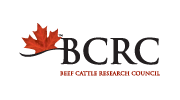Performance, Environmental and Economic Benefits of BioChar Supplementation in Beef Cattle Grazing Systems
| Project Code: | ENV.03.18 |
| Completed: | In Progress. Results expected in March 2022. |
Project Title:
Performance, Environmental and Economic Benefits of BioChar Supplementation in Beef Cattle Grazing Systems
Researchers:
Bart Lardner, University of Saskatchewan
Background
Biochar is engineered activated charcoal that has been previously shown to reduce methane emissions in ruminants. Although it can be purchased commercially there is little Canadian scientific work done to show that it can improve efficiencies and therefore reduce methane emissions in cows on pasture.
Objective
To reduce greenhouse gas emissions through feeding a biochar supplement to grazing cows.
What they will do
Researchers at the University of Saskatchewan and University of Guelph will perform the same trial at their respective locations each will provide 2 groups of cows with either a fibre pellet or a fibre pellet with biochar. They will measure methane emissions body weight, BCS, backfat, DMI, forage quality, FEC, manure samples, rumen fermentation, and rumen microbiome population diversity. They will also look at the economics of supplementation.
In a separate study 8 cows will be assigned to one of 4 different levels of biochar in their diets. Individual feed intake will be measured for each animal and the same measures as before will be recorded
Implications
This trial should provide producers with evidence to decide if feeding biochar on their operation would be economical and help to reduce methane emissions.






